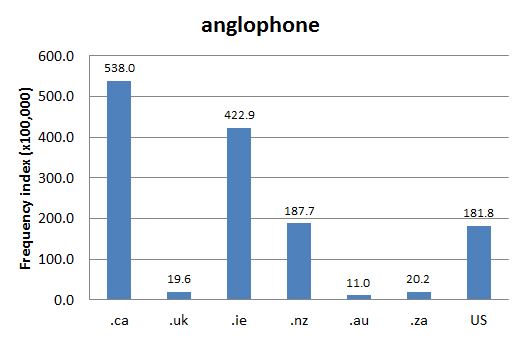DCHP-2
anglophone Anglophone DCHP-2 (May 2016)
1 adj.
speaking English as a first language ('mother tongue').
Type: 4. Culturally Significant — In OED-3, the earliest example, dated 1900, comes from a Canadian source. The word is rare until the 1960s. Our records show that it was first used to refer to English speakers in other parts of the world, such as Africa, but specialized in Canada to refer to Canadian English speakers as the country moved towards federal English-French bilingualism (see the 1969 quotation). As with other French words widely used in national debates, this meaning moved from Quebec French into Canadian English. While the term is used elsewhere, it is of high frequency in Canada (see Chart 1).
See also COD-2, s.v. "anglophone", which is marked "Cdn", Gage-3, s.v. "Anglophone" (2), which is marked as "Cdn.", ITP Nelson, s.v. "anglophone", OED-3, s.v. "anglophone" (adj.), and AHD-5, s.v. "Anglophonic".See also: allophone French immersion francophone official language
2 n.
a person whose first language ('mother tongue') is English.
Type: 1. Origin — See meaning 1.
See also COD-2, s.v. "anglophone", which is marked "Cdn", Gage-3, s.v. "Anglophone" (1), which is marked as "Cdn.", ITP Nelson, s.v. "anglophone", AHD-5, s.v. "Anglophone", and OED-3, s.v. "anglophone" (n.), which is marked as "Freq. in Canadian contexts".References:
Images:
Chart 1: Internet Domain Search, 23 Aug. 2012
